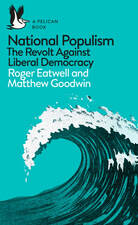National Populism is a crucial new guide to one of the most urgent political phenomena of our time. A Sunday Times bestseller and Financial Times book of the year, it has won widespread acclaim. The Economist said: "Intelligent ... counterintuitive ... [ranging] far beyond Brexit and Britain...they put a parochial debate in a much bigger context". The Daily Telegraph said: "A reality check to any clinging to the hope that populism is a passing political squall ... Goodwin is one of the few academics to be vindicated by the political trends of the past few years. With a forensic grasp of the detail ... [they] show how commentators have succumbed to "stereotypes" that correspond with their outlook rather than evidence-based conclusions". The Sunday Times said: "A fascinating new study ... the authors analyse the long-term demographic and socioeconomic trends shaping our age of upheaval. The attraction of this book lies in its cool, dispassionate tone. The authors intend to explain and inform rather than polemicise."
Across the West, there is a rising tide of people who feel excluded, alienated from politics and increasingly hostile towards minorities, immigrants and neo-liberal economics. Many of these voters are turning to national populist movements, which have begun to change the face of Western liberal democracy, from the United States to France, Austria to the UK. This radical turn, we are told, is a last howl of rage from an ageing electorate on the verge of extinction. Their leaders are fascistic and their politics anti-democratic; their existence a side-show to liberal democracy. But this version of events, as Roger Eatwell and Matthew Goodwin show, could not be further from the truth. Written by two of the foremost experts on fascism and the rise of national populism, this lucid and deeply-researched book is a vital guide to our transformed political landscape. Challenging conventional wisdoms, Eatwell and Goodwin make a compelling case for serious, respectful engagement with national populism - not least because it is a tide that won't be stemmed anytime soon.
Across the West, there is a rising tide of people who feel excluded, alienated from politics and increasingly hostile towards minorities, immigrants and neo-liberal economics. Many of these voters are turning to national populist movements, which have begun to change the face of Western liberal democracy, from the United States to France, Austria to the UK. This radical turn, we are told, is a last howl of rage from an ageing electorate on the verge of extinction. Their leaders are fascistic and their politics anti-democratic; their existence a side-show to liberal democracy. But this version of events, as Roger Eatwell and Matthew Goodwin show, could not be further from the truth. Written by two of the foremost experts on fascism and the rise of national populism, this lucid and deeply-researched book is a vital guide to our transformed political landscape. Challenging conventional wisdoms, Eatwell and Goodwin make a compelling case for serious, respectful engagement with national populism - not least because it is a tide that won't be stemmed anytime soon.
In 2016, the United Kingdom shocked the world by voting to leave the European Union. The first major academic study of the Brexit vote, Brexit: Why Britain Voted to Leave the European Union has since become one of the most highly cited studies on the subject. It reveals how the historic vote for Brexit marked the culmination of trends in domestic politics that have been building over years, if not decades. Drawing on a wealth of survey evidence collected over more than ten years, it explains why most people decided to ignore much of the national and international community and vote for Brexit. Drawing on past research on voting in major referendums in Europe and elsewhere, a team of leading academic experts analyse changes in the UK's party system that were catalysts for the referendum vote, including the rise of the UK Independence Party (UKIP), the dynamics of public opinion during an unforgettable and divisive referendum campaign, the factors that influenced how people voted and the likely impact of this historic decision.
'It would be hard to come up with a better line-up of analysts to dig into both the long- and short-term drivers of Britain's decision to leave the EU. Whether you're a Leaver or a Remainer, the vote for Brexit needs explaining - and this is just the book to do it.' Tim Bale, Queen Mary University of London and author of The Conservative Party from Thatcher to Cameron
'Do not read Brexit - unless you want truth rather than propaganda, objectivity rather than bias and evidence rather than prejudice. Harold D. Clarke, Matthew Goodwin and Paul F. Whiteley have written a book that will still be standing when the post-truth claims of those on both sides of the referendum have rightly crumbled to dust.' Peter Kellner, former President of YouGov
'Clarke, Goodwin and Whiteley have written what is sure to be a standard reference on Brexit. A wonderfully written history of the rise of the UKIP and the Brexit referendum lead to a diverse array of empirical analyses: a survey of UKIP members, longitudinal national surveys and pre-post referendum surveys. Instead of simple explanations, they show the variety of diverse factors that produced the final referendum outcome and discuss the implications for British politics going forward.' Russell J. Dalton, University of California, Irvine
'It would be hard to come up with a better line-up of analysts to dig into both the long- and short-term drivers of Britain's decision to leave the EU. Whether you're a Leaver or a Remainer, the vote for Brexit needs explaining - and this is just the book to do it.' Tim Bale, Queen Mary University of London and author of The Conservative Party from Thatcher to Cameron
'Do not read Brexit - unless you want truth rather than propaganda, objectivity rather than bias and evidence rather than prejudice. Harold D. Clarke, Matthew Goodwin and Paul F. Whiteley have written a book that will still be standing when the post-truth claims of those on both sides of the referendum have rightly crumbled to dust.' Peter Kellner, former President of YouGov
'Clarke, Goodwin and Whiteley have written what is sure to be a standard reference on Brexit. A wonderfully written history of the rise of the UKIP and the Brexit referendum lead to a diverse array of empirical analyses: a survey of UKIP members, longitudinal national surveys and pre-post referendum surveys. Instead of simple explanations, they show the variety of diverse factors that produced the final referendum outcome and discuss the implications for British politics going forward.' Russell J. Dalton, University of California, Irvine
The UK Independence Party (UKIP) was the most significant new party in British politics for a generation. Its rise set the stage for the later vote for Brexit. The first serious study of UKIP and its supporters, Revolt on the Right drew on an unprecedented amount of survey data and interviews with party insiders to explain its rise and impact. Winner of the 2015 Political Book of the Year and long-listed for the Orwell Prize, Revolt has since been selected by academics as one of the most influential twenty books in modern Britain.
"...one of the most important books on British politics to have appeared for many years." Professor Vernon Bogdanor, Kings College London
"Revolt on the Right is a rich and insightful dissection of Britain's first new major political force in a generation. Ford and Goodwin combine rigorous yet accessible statistical analysis of UKIP's supporters with unprecedented access to party activists and leaders. They paint a detailed portrait of the social forces driving UKIP's emergence and how the party itself has developed to mobilise a new mass electorate. This book is essential reading for anyone looking to understand this fascinating, and potentially disruptive, new force in British politics." Anthony Heath, University of Oxford and University of Manchester.
"This book presents an insightful and highly informative analysis of the most significant independent challenge to the existing party system in England. It is a must read for anyone interested in the future of British politics." John Curtice, Professor of Politics at Strathclyde University and a research consultant for ScotCen Social Research
"As the first serious study of the biggest challenge to the political status quo in 30 years, Revolt on the Right will be hard to better. It is both a garish picture of what the British right looks like when it has had one beer too many, and a sympathetic and occasionally touching account of the frustrations of the white working class voters progressive culture and conservative economics have decided they can do without." Nick Cohen, The Observer
"Ford and Goodwin haven’t just talked to everyone who counts and crunched all the data that’s out there. They’ve produced a really approachable book on a party which, by providing disoriented and disillusioned voters with the alternative they’ve been looking for, may well make a big impact at the next election and beyond." Tim Bale, Professor of Politics, Queen Mary University of London, author of The Conservative Party: From Thatcher to Cameron
"Revolt on the Right is not just a timely and fascinating book; it is also an important one: the first detailed study of one of the most significant developments in modern British politics – the rise of UKIP, which not only taps into popular discontent with the European Union, but has emerged as Britain’s first major non-toxic party to the right of the Conservatives." Peter Kellner, President of YouGov
"Vital for anyone studying modern British politics seriously." Ben Page, Chief Executive of Ipsos MORI
"This is an outstanding contribution to understanding contemporary politics: a rigorous assessment of the attitudes and demographics of UKIP voters as well as a brilliant story of the people and feuds behind the disorderly rise of a popular movement." John Rentoul, Chief Political Commentator, The Independent on Sunday.
"...one of the most important books on British politics to have appeared for many years." Professor Vernon Bogdanor, Kings College London
"Revolt on the Right is a rich and insightful dissection of Britain's first new major political force in a generation. Ford and Goodwin combine rigorous yet accessible statistical analysis of UKIP's supporters with unprecedented access to party activists and leaders. They paint a detailed portrait of the social forces driving UKIP's emergence and how the party itself has developed to mobilise a new mass electorate. This book is essential reading for anyone looking to understand this fascinating, and potentially disruptive, new force in British politics." Anthony Heath, University of Oxford and University of Manchester.
"This book presents an insightful and highly informative analysis of the most significant independent challenge to the existing party system in England. It is a must read for anyone interested in the future of British politics." John Curtice, Professor of Politics at Strathclyde University and a research consultant for ScotCen Social Research
"As the first serious study of the biggest challenge to the political status quo in 30 years, Revolt on the Right will be hard to better. It is both a garish picture of what the British right looks like when it has had one beer too many, and a sympathetic and occasionally touching account of the frustrations of the white working class voters progressive culture and conservative economics have decided they can do without." Nick Cohen, The Observer
"Ford and Goodwin haven’t just talked to everyone who counts and crunched all the data that’s out there. They’ve produced a really approachable book on a party which, by providing disoriented and disillusioned voters with the alternative they’ve been looking for, may well make a big impact at the next election and beyond." Tim Bale, Professor of Politics, Queen Mary University of London, author of The Conservative Party: From Thatcher to Cameron
"Revolt on the Right is not just a timely and fascinating book; it is also an important one: the first detailed study of one of the most significant developments in modern British politics – the rise of UKIP, which not only taps into popular discontent with the European Union, but has emerged as Britain’s first major non-toxic party to the right of the Conservatives." Peter Kellner, President of YouGov
"Vital for anyone studying modern British politics seriously." Ben Page, Chief Executive of Ipsos MORI
"This is an outstanding contribution to understanding contemporary politics: a rigorous assessment of the attitudes and demographics of UKIP voters as well as a brilliant story of the people and feuds behind the disorderly rise of a popular movement." John Rentoul, Chief Political Commentator, The Independent on Sunday.


